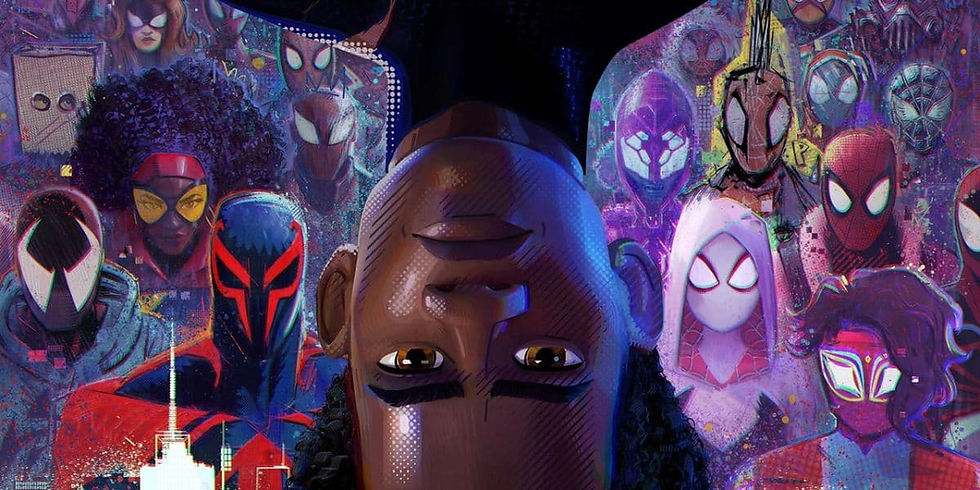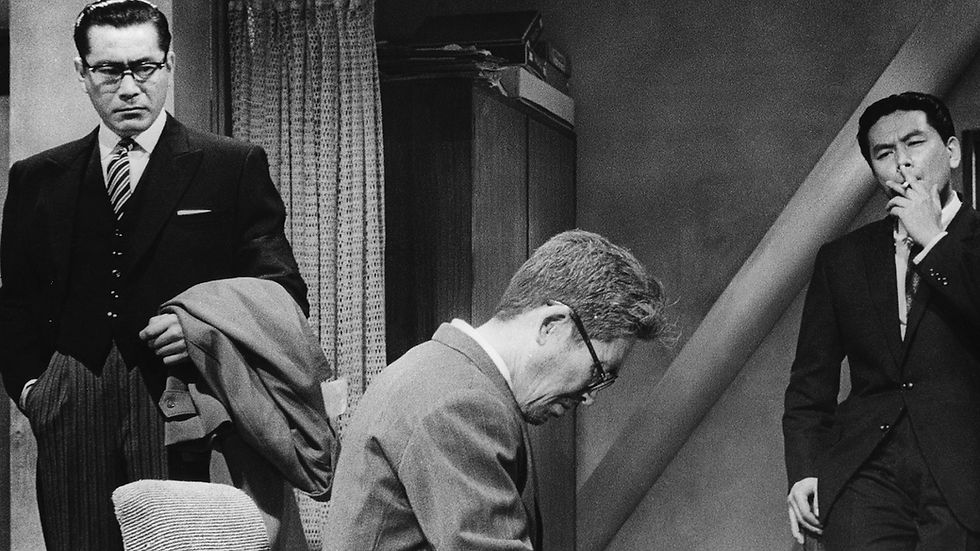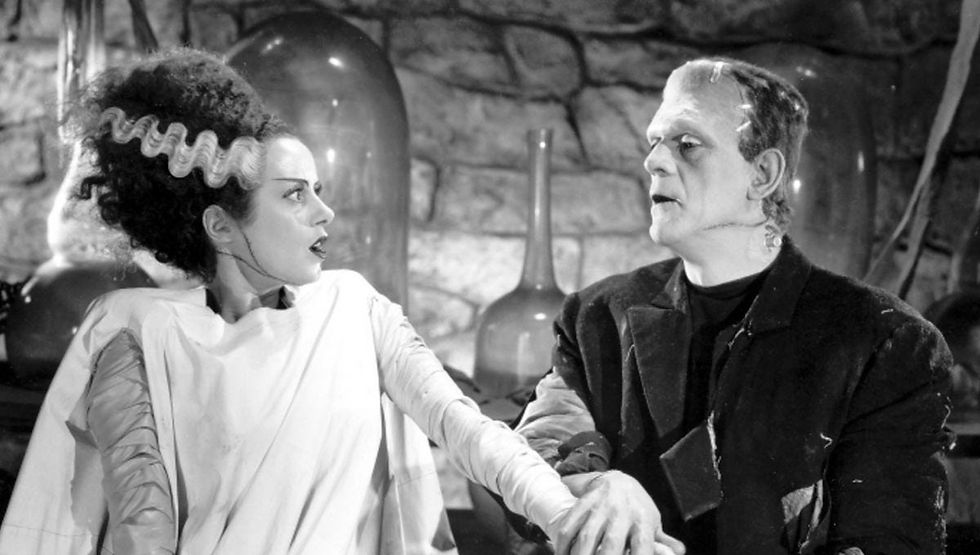Essay: Why I Will Never See Spider-Man: Across the Spider-Verse
- Dylan McCully
- Jun 5, 2023
- 9 min read
Updated: Sep 22, 2023
Written by Dylan McCully, 06/05/23

Cinema is dead. Or so all of these high-name directors say.
“Hollywood’s like Egypt, full of crumbled pyramids. It’ll never come back. It’ll just keep on crumbling until finally the wind blows the last studio prop across the sands.”
- David O. Selznick
There are other quotes similar to this which I don't feel like sourcing, but believe me they're there. All of these were actually said in the 1950's, but as we now know, cinema did not die in the 1950's, in fact, the time when cinema was the most alive was in the 1960's and the 1970's. This was the time period were creativity was rampant and directors were encouraged to find their individual voices in storytelling. Since the beginning, this has always been the secret to cinema. Individual storytellers sharing their stories with a mass audience. The only way to build a mass audience is through a consistent voice. The New Hollywood era, which I would group that into the larger New Wave era that started with the critics at Cahiers du Cinéma, is the best representation of this "auteur" cinema. Godard, Truffaut, Fellini, Antonioni, Cassavetes, Coppola, Scorsese, and Lynch are only a few of the legendary directors to come from this time period, and they are all considered to be masters of the craft. Now, cinema is still a young artform. You have the silent era with Griffith and Chaplin, then the studio era with MGM, Warner Bros. and the likes, the New Wave era with the directors I previously mentioned, then the commercialized version of cinema that has continued until the present. That is four eras. Compare that to literature, or painting, or music, and you'll see that cinema has only just begun. If it's just begun, how can it be dead?
“Juxtaposing a person with an environment that is boundless, collating him with a countless number of people passing by close to him and far away, relating a person to the whole world, that is the meaning of cinema.”
-Andrei Tarkovsky
Well, art begins when inspiration meets an active mind. The process of creation is completely internal, despite being represented by external means. Art only exists when exhibition and interpretation begins, and for a film, that is in the theater. What's unique about the artform of cinema, however, and the factor that makes it the superior medium is the shared experience of watching a film. Since the beginning, films have been projected to a mass audience, all given the same story. When looking at a painting, everyone takes something different from it. People read books by themselves. A live concert is the only thing similar to watching a film in a theater, but the difference is that a film can do much more than a concert. The score of a film, the composition of the images flickering on the screen, the acting - an art which has its roots in stage, and of course, the editing. It's a combination of every artform to tell a story, but when you're watching it, it's not a story. It's real. When a performer is on stage, they are simply performing, but for some reason, when images of humans are projected at 24 frames per second, using camera and cutting techniques to enhance emotion, it becomes real. And these realities get to be shared with a large group of strangers, giving each viewer a profound sense of humanity. In a theater, you have to surrender to the film. Watching a film at home can be fun, but there are far too many distractions that we take for granted, such as the benefit of pausing a film. At home, you control the movie. In a theater, the movie controls you. Going to the theater used to be an event. You would dress up nice and go to a palace to see something with your friends, lovers or family. There was and still is nothing else quite like it.
The movie theater is never going away. If that was a case why are there still restaurants? People still have kitchens in their home!
For a while, the theater was the only way to see a movie. This is what the legendary directors of the New Wave were raised on. This is why classics become classics. Any true director realizes this. Television was the original movie killer, but because cinema gained freedom in the 1960's, along with the youth of that generation, who also enjoyed classic films, a new golden age was created where new styles were being invented and classic films were being respected. Then, the 80's. Conservatism and corporate "yuppie" culture brought us the overstimulation and commercialism that defacated on art throughout the 80's and after. True art has always shined through, but the focus on financial and social gain above artistic freedom and unique, challenging stories has left cinema bereft of life. Some people say that that cinema was revived in the 90's, but I disagree. There are great films that come out every year. There are always auteurs somewhere. Cinema as a whole, however has relied on blockbusters ever since Spielberg and Lucas' boy scout movies made it big.
“A really efficient totalitarian state would be one in which the all-powerful executive of political bosses and their army of managers control a population of slaves who do not have to be coerced, because they love their servitude.”
-Aldous Huxley, Brave New World
Superhero movies have dominated the last decade, to the chagrin of cinephiles around the world. Superhero movies are devoid of meaning. There only purpose is to make money. That is not art. These are simply commercials for the companies that produce them. Corporations have manipulated the publics taste for films by giving them dopamine kicks of every they like. This is '80's culture at its core. You liked Star Wars? Here's another one. You liked that one? Now every movie is not just a singular story anymore, but a franchise. You liked the heavier sounds of Black Sabbath and the showmanship of Glam Rock? Here are these awful "hair" bands. Music became easier to digest, but reached a point where there was no artistic value in it at all. MTV - the only musical influence that had nothing to do with music. Everything that once had meaning lost it's value. The Sexual Revolution broke free of religious norms that dominated society for so long, but now, it was no longer believed in. The 80's and 90's were the eras of sexual harrassment in the workplace and bolt-on tits. Ever watch a music video? Beauty in the 60's and 70's was more intelligent and charming, and natural beauty was common. Ever since the '80's, beauty has been commercialized. The scene where Marcello Mastroianni stands in front of Anita Ekberg in the fountain in La Dolce Vita is an immortal scene that really highlights the themes of unobtainable fame and glamour in the film, and in resonated in audiences because it was represented by arguably the most beautiful woman in the world, Anita Ekberg. Her perfect face, voluptuous curves and incredible charm was the height of beauty personified. Beauty, and in a deeper sense, sex, is the main inspiration for art. Just ask yourself how many artists have painted women or how many songwriters have written about love? Love is the key to the human condition, and when love becomes bouncing boobs and fake nails, there is going to be a problem in the larger scope of things.
"And after a while, you can work on points for style
Like the club tie, and the firm handshake
A certain look in the eye and an easy smile
You have to be trusted by the people that you lie to
So that when they turn their backs on you,
You'll get the chance to put the knife in"
-Roger Waters, Animals
You see, this has all been done purposefully. The less people communicate, the less they love, the less they feel, and the more than buy, the more it benefits the people who make the decisions. From a capitalist perspective, cinema became something that could be taken advantage of for monetary gain. This is the result of Jaws and Star Wars, although that was never the intent of the filmmakers. This is why the music of Frank Zappa became the music of Lil Durk. They've tricked us. They got us good. And now a lot of people who grew up in a time of freedom are getting old and dying. The last few voices ring the loudest. Scorsese's comments about the state of cinema made ripples in the public perception of Marvel movies, and now they are critical failures and beginning to lose money. Lynch changed what could be done on television with Twin Peaks: The Return. These are auteurs. Smart phones were invented to keep people connected. Social media to. A lot of these major innovations were surprisingly created for innocent reasons. But, greed took over, and corporations realized the effect that social media has on society. The amount of followers, the amount likes, a comment, a post - none of this is real in that fact that none of this is tangible. But perhaps because of this, many internalize it and create meaning for it. Most things said on social media would never be said person to person, and yet, smartphones give you a dopamine rush that keeps you addicted, and keeps you active online. More people are actice online than in reality, which gives the online word meaning. The lowering of attention spans is only one of the harmful effects of social media and smartphones. (I know I sound old here, but hear me out). The biggest detriment of this technological age, however, is the downfall of curiosity. It's impossible to be curious when more information than we can process is given to us and every second. That is the key to manipulation, giving us so much so look at that we never stop and think.
“The masses never revolt of their own accord, and they never revolt merely because they are oppressed. Indeed, so long as they are not permitted to have standards of comparison, they never even become aware that they are oppressed.”
-George Orwell, 1984
Disney has had audiences shelling out cash to see the same thing over and over again for a while now. It's despicable. These corporations purposely make the adult life mundane and exploit the natural curiosity you had as a kid and shove a processed version back to you as an adult. It's honestly embarassing that anyone saw The Little Mermaid in theaters. Buying a ticket is sending a message that you want more of what you saw. My money is better spent at the Music Box Theater or the Gene Siskel Film Center. I truly feel bad for the youth of today. M-m-m-my generation. We grew up on mediocre kids movies, maybe some good shows, but now have been led to believe that Marvel movies are movies. That Disney remakes are acceptable. These commercial entities are the antithesis of art. The corporations have made society accept mediocrity. Studios put out the same thing every time, and a lot of new filmmakers have their voice polluted by the state of society as well. I don't see a lot of unique visions from young filmmakers, especially in America. This is due to everything I've mentioned above, and instead their films are grounded in what the French critics used to call "psychological realism". This bores me. The TikTok style of filmmaking that is becoming popular from Ari Aster or The Daniels bores me as well. Harper/McCully films will try to present truth in an entertaining way, more akin to the classics, and we will configure our own style of filmmaking.
Everything else we shall destroy – everything. Already we are breaking down the habits of thought which have survived from before the Revolution. The sex instinct will be eradicated. Procreation will be an annual formality like the renewal of a ration card. We shall abolish the orgasm. Our neurologists are at work upon it now. There will be no loyalty, except loyalty towards the Party. There will be no love, except the love of Big Brother. There will be no laughter, except the laugh of triumph over a defeated enemy. There will be no art, no literature, no science. When we are omnipotent we shall have no more need of science. There will be no distinction between beauty and ugliness. There will be no curiosity, no enjoyment of the process of life. All competing pleasures will be destroyed.”
-George Orwell, 1984
This is why I will not being seeing Spider-Man: Across The Spider-Verse. Everyone that I have heard from has said that it is an amazing film, and yet, I don't believe it. To me it's a superhero sequel that looks like an AI-generated, Tik-Tok induced mess. And for that, I refuse to watch it. These 1984 quotes may seem depressingly true, but to become depressed by the state of things is an idiotic decision, as that means you have accepted it. Not me. To create is to revolt, as art is an enemy of tyranny. To love is to revolt, as love is an enemy of tyranny. These principles are the basis of what our films are founded on, not money, not just for fun, but for truth. To save cinema is simple. Create films that defy convention, yet still grab an audience. Create films influenced by classics rather than TikTok. If you have something to say, that you truly believe in, then say it. Say it loud. That is my philosophy. Spider-Man: Across The Spider-Verse may be the greatest film ever made, but I refuse to see it, because I do not view this film as art. Ava, on the other hand, will be seeing this in theaters, and she will write her review after shes watches it.






Comments